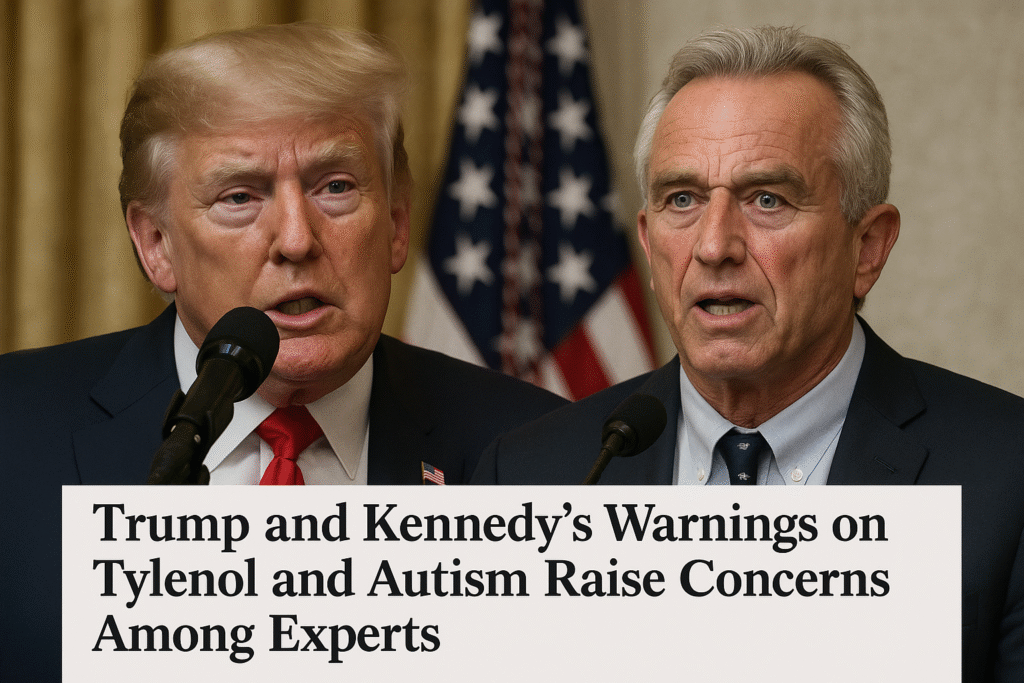By Harshit | October 12, 2025 | Washington, D.C. | 4:30 AM EDT
Experts Question Claims Linking Tylenol to Autism in Children
Recent statements from President Donald Trump and Health Secretary Robert F. Kennedy Jr. suggesting a link between Tylenol and autism in children have raised alarms among medical professionals. Initially, the warnings focused on Tylenol use during pregnancy, but they have quickly expanded to include infants and young children.
“Don’t give it to the baby when the baby’s born,” Trump stated at a Cabinet meeting. Kennedy further claimed that circumcised children have higher autism rates, “likely because they’re given Tylenol.” These claims, however, lack robust scientific support, and experts say they risk spreading misinformation that could confuse parents and caregivers.
David Mandell, a psychiatry professor at the University of Pennsylvania, emphasized that the evidence linking Tylenol use in early childhood to autism is even weaker than concerns about prenatal exposure. “There’s even less evidence that there’s a link between Tylenol in early childhood and autism than there is that Tylenol taken during pregnancy causes autism,” Mandell said.
FDA and Pediatric Guidance
Tylenol, whose active ingredient is acetaminophen, is one of the most commonly used over-the-counter medications for pain and fever in both children and adults. The FDA maintains that moderate use of acetaminophen is safe in pregnancy and childhood. In September, the FDA issued guidance asking physicians to “consider minimizing the use of acetaminophen during pregnancy for routine low-grade fevers,” but explicitly noted that no causal relationship with autism has been established.
The American Academy of Pediatrics also recommends that Tylenol is safe for children when used according to dosing instructions. Children under 12 weeks of age should only receive acetaminophen under a doctor’s guidance, as it can mask early signs of infections like sepsis, which require immediate treatment. Overall, decades of research support the safe use of the medication when properly administered.
Concerns About Public Messaging
The recent warnings from Trump and Kennedy have raised concern among autism researchers and pediatricians, who warn that the statements could cause unnecessary fear among parents. Dr. Joshua Gordon, chair of the psychiatry department at Columbia University, said the pattern mirrors tactics used by anti-vaccine activists, who often start with a single question, and when evidence debunks it, they shift the focus slightly to prolong public debate.
“No amount of scientific evidence can ever be conclusive for this community,” Gordon said. “The debate is like a hydra. You cut off one head and they’re just going to try to emerge with another.” According to Gordon, such messaging can mislead parents into making decisions that are not based on science, potentially placing children at risk by discouraging the safe use of common medications.
Industry Response
Kenvue, the company that manufactures Tylenol, has strongly defended the safety of acetaminophen. “It is one of the most widely studied pain relievers and fever reducers in infants and children, and numerous randomized, controlled clinical trials support its safety when used as directed,” a company spokesperson said. They emphasized that independent research clearly shows no link between acetaminophen and autism.
Mandell noted that the studies cited by proponents of the Tylenol-autism connection are low-quality and do not prove causation. One small study found that children with autism were more likely to have received acetaminophen for fever compared to children without autism. However, this association is likely confounded, as children with autism often experience more discomfort or fever, leading parents to administer the medication more frequently.
The Risk of Public Confusion
Experts warn that the public messaging from Trump and Kennedy could lead to unnecessary anxiety among parents and caregivers. “These statements may discourage the appropriate use of acetaminophen, which is critical for treating pain and fever safely in children,” said Dr. Mandell. Pediatricians emphasize that avoiding or under-dosing Tylenol due to unfounded fears could result in untreated fevers or pain, sometimes masking serious underlying illnesses.
White House spokesperson Kush Desai said, “The President is right to express his commonsense opinion that Americans should use caution with all medications and adhere to FDA guidance, including the longstanding guidance regarding appropriate use and dosage of acetaminophen in young children.” While caution is reasonable, health experts stress that parental adherence should be guided by science rather than speculation.
A Call for Evidence-Based Guidance
The broader medical consensus remains clear: acetaminophen is safe when used as directed, and there is no scientifically valid evidence linking it to autism in either pregnant women or young children. Experts urge parents to follow dosing instructions and consult pediatricians when necessary.
“Moderate use of acetaminophen is an essential tool for caregivers,” Mandell said. “Misinformation about autism risks could do more harm than good, discouraging parents from treating common conditions like fever or discomfort.”
As the discussion continues, health professionals emphasize that public messaging should remain grounded in evidence. Parents and caregivers are encouraged to rely on guidance from the FDA, pediatricians, and established scientific research to ensure the safety and well-being of children, rather than unverified claims circulating in the media.

